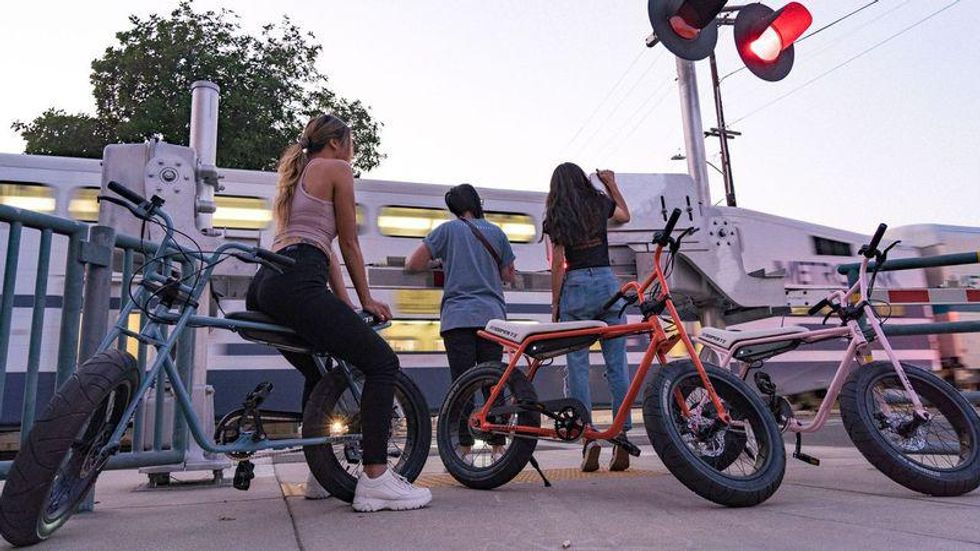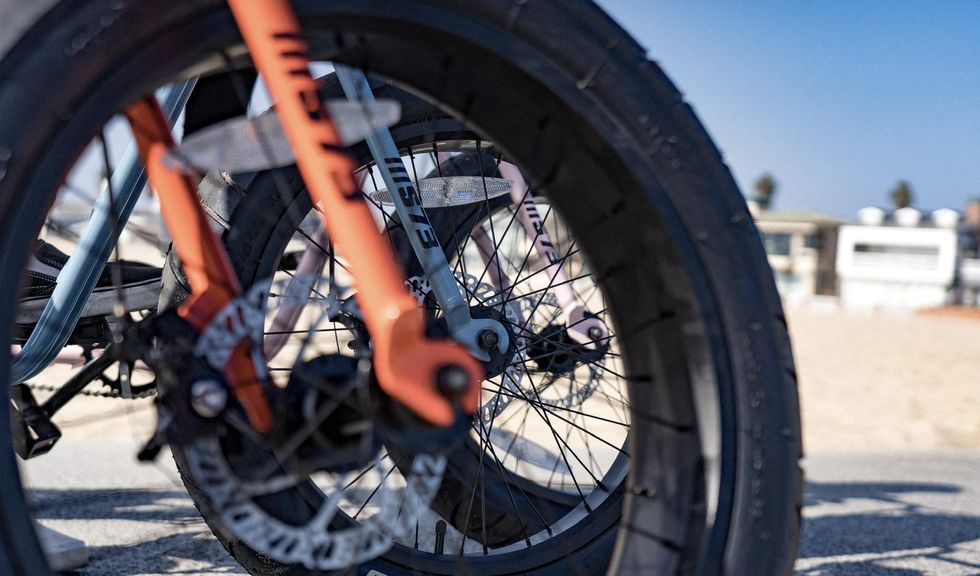E-Bike Manufacturers Are Rethinking Los Angeles. Here's What They See

In January 2020, just before the pandemic hit, Irvine-based electric bike manufacturer Super73 had just launched its newest bike models — the S2, R, and RX — and business was surging.
Then the pandemic hit.
"There was a day in March when [Gov. Gavin Newsom] declared a state of emergency, everything shut down, and we saw our sales drop quite a bit. We were like, 'uhhh, buckle up, what's coming?'" said co-founder and Chief Marketing Officer Michael Cannavo.
The prospect of customers sheltering at home and avoiding the outdoors and other people seemed like a death knell. In April, Lime laid off 13% of its staff, saying it had been forced to shut down 99% of its markets to support cities' social distancing measures.
"Then, the rest of the year, every single day was a record-breaking day," Cannavo said. "The biggest issue of 2020 was just trying to keep up with the demand."
As Los Angeles and the world emerges from the worst days of the pandemic, interest in electric bikes is surging, with several Southern California e-bike startups recently announcing new funding and expansions. The surge derives from several trends that emerged during the pandemic, including a rise in the popularity of bikes, a move toward clean transportation technology and the boom in ecommerce and deliveries.

E-Bikes' Rebirth
Earlier this month, Lime revealed it would spend $50 million on a large e-bike expansion, upgrading and quadrupling its LimeBike fleet, and adding service to 25 new cities in 2021.
The company raised $170 million in an investment round led by Uber in May, and has acquired Uber's bike-share system, Jump.
Lime, which launched as LimeBike in 2017, initially only offered e-bikes, but changed its name and pivoted to focus on electric scooters shortly thereafter.
Its bikes and scooters are considered last-mile solutions, giving people a convenient option for short, local trips, or an easy way to get from a train or bus station to their final destination. Lime's newest e-bike, slated to debut this summer, will come with a 350-watt motor and a swappable battery that works interchangeably with its electric scooters.
Electric bikes differ from traditional bikes in that they use a rechargeable battery to power a motor. While cyclists can still pedal an e-bike, the motor can help with difficult hills, long trips or, in some cases, heavy cargo.
Laws pertaining to e-bikes vary from city to city, but most are classified as bicycles and can use the same infrastructure, including lanes and bike racks, as their non-motorized counterparts. A 2019 study found that e-bikes offered an affordable alternative to owning a car, while still providing the exercise and recreational benefits of a traditional bike. Additionally, the widespread use of e-bikes could reduce C02 emissions, urban noise, air pollution and inner-city traffic.
According to Lime demand for e-bikes surged globally during the pandemic as people began to favor single-rider outdoor choices to public transit or rideshare services.
"Shared micromobility is playing an essential role in getting cities moving again safely so we see this as a critical moment to double down on e-bikes as an open-air, socially-distanced transportation option," Lime CEO Wayne Ting said in a statement.
Super73's Cannavo said he saw a similar surge in interest, coupled with a newfound sense of freedom and community.
"We had become a tool for people who were trapped in their houses," he said. They were buying our bikes as a source of joy and pleasure in a really uncertain time."
When Super73 went looking for funding in Silicon Valley in 2017, they didn't catch much interest. Investors were more interested in backing an app — such as Bird or Lime — than a new bike product. But now, Cannavo said it's clear that their bike's value "isn't a last-mile option as much as it's a lifestyle option."
The e-bikes retail for between $1,260 and $3,245 and are highly customizable, from their color schemes and handlebars to seating and battery placement.
Super73 owners have built a community around their bikes, regularly attending group rides and meetups in cities around the world. Cannavo said a typical event draws around 90 riders. About a third of U.S. Super73 owners and about half in Europe have completely ditched their car for the bike. This is common in urban areas and small towns, but even more so in cities like Paris or Amsterdam, where gas-powered vehicles are being phased out.
"It gives people who can't afford a car or want another option for transportation, or who just want something fun to get around on the weekends," Cannavo said. "You still get the thrills [of riding a bike], you're interacting with your city, and it really connects you more to your community which is why I think our group rides are so successful. Suddenly you're going down streets you've never gone before because your car could never take you there and you're finding the hidden gems within the city and that's because you got out of your car."
The company announced last month it had raised an additional $20 million from investors including Volition Capital, which it plans to use to develop new anti-theft technology as well as to grow its operations and diversify its supply chains. Cannavo said he also hopes to open more international showrooms on top of those in Irvine and Amsterdam.

Re-Imagining Delivery
Pasadena-based URB-E sees itself on the forefront of two recent trends. One is the push to transition to electric vehicles amid climate concerns. The other is the dramatic surge in demand for delivery services, something that was already on the rise before COVID-19 and which CEO Charles Jolley predicts won't slow down after the pandemic.
The company pivoted in 2019 from manufacturing foldable scooters into a delivery network powered by e-bikes. It also recently raised a $5 million Series A round and named Jolley, an Apple and Facebook veteran, its new CEO.
Consumers have become used to the convenience of delivery, Jolley said, and they aren't likely to let that go.
"Where a company like URB-E comes into play is that we think the next stage is to transition to where you're doing much higher density kinds of deliveries like groceries or parcels or food deliveries out of ghost kitchens. For all of those, you need much more efficiency than what you get out of a bike with a small package on it."
E-bikes, not cars or trucks, he said, offer the fastest, easiest way to transition to doing more deliveries in a way that's mindful of the climate.
"Replacing a five-ton truck with a five-ton electric truck that's just three tons of battery isn't feasible. We don't have enough lithium iron in the world to do that, so we have to come up with smarter solutions if we're going to make that transition," he said.
URB-E bikes are engineered by Chief Technical Officer Sven Etzelsberger, previously a lead engineer at Porsche, to be high-performance machines. They attach to a container that can carry up to 800 pounds of cargo, which riders can move through cities at 12 mph thanks to the bike's high torque.
"Our first application is mostly same-day delivery, but we're also doing parcel delivery with some companies," Jolley said. "So a big company might bring a truck to the edge of a neighborhood like Santa Monica, and inside the truck would be containers they could pull out to waiting bikes, who'd do the last-mile delivery."
URB-E will deploy this exact concept in Santa Monica and Downtown Los Angeles this year, and will also update the e-scooters it uses in Pasadena with e-bikes.
The startup doesn't compete with existing delivery providers but works with them. So, for example, a business could provide its own drivers to use URB-E's system, or a delivery provider that already works with a grocery store or retailer could rent URB-E's fleet and technology platform on an hourly basis. Those delivery companies would then save on equipment, maintenance and storage costs.
"It's really trying to make all of the infrastructure, technology, software and equipment just completely turnkey," Jolley said.
- Here's How Bird Laid Off 406 People in Two Minutes - dot.LA ›
- Lime Temporarily Shuts Down in California Due to Coronavirus - dot ... ›
- Lyft Launches E-Bikes in Santa Monica as Micro-Mobility Surges ... ›
- Retrospec Launches a Line of E-Bikes - dot.LA ›
- Rivian Files Trademark to Produce Electric Bikes - dot.LA ›
- URB-E Joins Santa Monica’s Zero-Emission Delivery Zone Pilot - dot.LA ›
- Lime Piloting New Motorbike - dot.LA ›
- Super73 Co-Founder and CEO Turned his Biking Passion Into a Business - dot.LA ›
- Rad E-Bikes Sued After 12-Year-Old's Death in LA - dot.LA ›





 Image Source: Tinder
Image Source: Tinder Image Source: Apple
Image Source: Apple